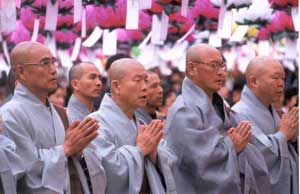
|
|
|
Home Asia Pacific North Asia S/N Korea News & Issues 'Korean Buddhism has a lot to offer to the world'By Lee Sun-young, The Korea Herald, May 14, 2005Seoul, South Korea -- Korean Buddhism, with its deep store of untouched resources and well-preserved traditions, is making big strides to reach out to the world, a prominent leader of Korean Buddhists said.
<< "The unique ways of ascetic practices and enlightening the mind that have been handed down through generations of Korean monks are a treasure for mankind" - Ven. Bub-jang "The unique ways of ascetic practices and enlightening the mind that have been handed down through generations of Korean monks are a treasure for mankind," said Ven. Bub-jang, president and executive director of the 31st Administration of the Jogye Order, the largest Buddhist sect in Korea. "The meaning of human life, as said so many times, is found only in the spiritual realm, even in this materialistic era, and Korean Buddhism can offer the world a way of awakening one's spiritual world " Buddhism in Korea dates back some 1,600 years and today Buddhists comprise about 26 percent of the population, forming the largest religious group in Korea. While Buddhism in China, Japan and many Southeast Asian countries has attracted attention from scholars and become familiar to many people in the West, Korean Buddhism has long been left unexplored, the Jogye leader explained in an interview with The Korea Herald at Jogye Temple, the Order's headquarters in central Seoul on Monday, a day before leaving for Irbil, Iraq. The 63-year-old monk visited the Korean troops stationed in Irbil for three days to deliver Buddha's message before Buddha's birthday tomorrow. According to Ven. Bub-jang, Korean monks have preserved a traditional practice called "ganwhaseon," or koan meditations, in which the Zen masters throw seemingly absurd questions at practitioners, who then meditate intensively on the issues and this eventually awakens their minds and gives them a new perspective on life. Korean monks still observe about 180 days of retreats practicing ganwhaseon during which they sit and meditate with a specific question in mind called the "hwadu" or Zen koans. "The ganwhaseon allows us a moment of enlightenment that is beyond reading the canon ten trillion times - the kind of awakening mankind is searching for," Ven. Bub-jang said. Recognizing the Internet as a crucial and most effective tool for globalization of Korean Buddhism, he has been pushing to set up Web sites in three major languages - English, Japanese and Chinese - so anyone interested in Korean Buddhism can find information online as well as ask questions of Korean monks. Currently, two major Web sites operated by Jogye Order provide information in English on Korean Buddhism: eng.buddhism.or.kr and eng.koreatemple.net. The order plans to further explore the online medium to introduce and spread the teachings of Buddha, as well as the unique values of Korean Buddhism. Translating the essays or writings of Buddhists into foreign languages is another task to be tackled, he said, pointing out the need to make it easily understandable for laypeople. Ven. Bub-jang cited the well-known Vietnamese Ven. Thich Nhat Hanh as an example. "Ven. Thich has acquired an ability to convey his thoughts in such simple and easy words. Now his books are read by tens of thousands of people all over the world." He added, "It is not that Korea has no such great monks. We do have and have had some greatest masters. But because of our time-old tradition of 'do not reply before you're asked,' Korean monks were just not used to explaining in easy words what Buddha has taught and what they have realized." Having entered the Buddhist priesthood at the age of 21 at Sudeok Temple, South Choongcheong Province, Ven. Bub-jang has undertaken five times weeklong lion-retreats - in which the practitioner does not sleep or lie on the floor for days, concentrating on meditation. He has also done 21-day fasting on seven occasions. He recalled one experience when he finished meditating after what he felt had been a few minutes to discover he had really been in deep meditation for over eight hours. Ven. Bub-jang became involved in Order Administration back in 1981 and held key posts before he was elected as president and director general of the Order in February 2003. |
 |
|
| Korean Buddhist News from BTN (Korean Language) |
|
 |
|
|
Please help keep the Buddhist Channel going |
|
| Point
your feed reader to this location |
|




